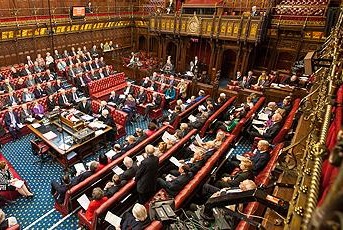MPs will consider latest Lords amendments after Easter break as ping pong continues
The House of Lords yesterday required the Government to think again over its Safety of Rwanda (Asylum and Immigration) Bill after inflicting a further seven defeats on the controversial legislation.
 Image credit: UK GovernmentOn Monday, the House of Commons as expected voted to reject all of the earlier Lords amendments. Following yesterday's fresh defeats in the Lords, the Bill will now not return to the Commons until after MPs return from the Easter break.
Image credit: UK GovernmentOn Monday, the House of Commons as expected voted to reject all of the earlier Lords amendments. Following yesterday's fresh defeats in the Lords, the Bill will now not return to the Commons until after MPs return from the Easter break.
The Leader of the House of Commons confirmed this morning that MPs will consider the latest Lords amendments on 15 April.
Speaking for the Opposition in yesterday's debate in the Lords, Labour's Lord Coaker said it was not the fault of the Lords that the Bill would be delayed until after Easter.
Lord Coaker stated: "The serious point I am making is that the Government need to answer the question: if they are accusing this Chamber of delaying the Bill, why is it not going to be back in the other place on Monday 25 March and back here on Tuesday 26 March, when it could be dealt with again? Where is the answer to that? We are now told that it is coming back after Easter. That is not our fault; it is the Government's management of their own timetable. They need to sort this out and try to understand what is going on."
With reference to the swift rejection of the Lords' earlier amendments in the Commons on Monday, Coaker added that it had come as a surprise that the Bill had been returned to the Lords without a single word changed.
"We have said all along, and I repeat here, that it is not our intention to block the Bill, but it is also part of constitutional convention that the other place reflects on what your Lordships have said and does not just carte blanche reject it, which is what has happened. Who is not respecting constitutional convention now?" Coaker asked.
Lord Stewart of Dirleton opened the debate for the Government and again stressed the Government's position that there is nothing in the Bill that requires any act or omission that conflicts with the UK's international obligations.
"Although some of the provisions in the Bill are novel, the Bill strikes the appropriate balance of limiting unnecessary challenges that frustrate removal while maintaining the principle of access to the courts where an individual may be at real risk of serious and irreversible harm. … Taken as a whole, the limited availability of domestic remedies maintains the constitutional balance between Parliament being able to legislate as it sees necessary and the powers of our courts to hold the Government to account," Lord Stewart told the Lords.